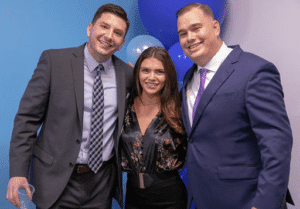
QO alumni and friends James Scribner (QO 2004) and Corey Hassett (QO 2006), The Freedom Center cofounders, and Karen Rose Siegel (QO 2007) of Karen Rose Public Relations, NYC, celebrated the opening of The Freedom Center on Oct. 11.
If someone had told Quince Orchard High graduate James Scribner at his 2004 graduation that in 14 years, he and two of his QO friends, all three in recovery from addiction, would be moved to start a Gaithersburg-based center offering intensive outpatient treatment for drug and alcohol substance use disorder, Scribner would have been perplexed.
Corey Hassett (class of 2006) and Sam Kesaris (class of 2007), Scribner’s former schoolmates and, with him, cofounders of The Freedom Center, also would have been baffled.
They could not know that one day, living in recovery from addiction, they would seek a way to bring the hope of recovery to others.
No one plans a journey into addiction, Scribner, executive director of The Freedom Center, explained. “It started for me in the early years of high school and progressed quickly. I never imagined that it would totally take over my life the way that it did.”
Corey Hassett is director of community outreach at the center. He had a similar experience. “In high school, we thought it was just ‘good times.’ But, I took the party to a whole other level for multiple years.”
With fulfilling lives in addiction recovery, the three gravitated toward each other and a shared dream. On Oct. 11, 2018, local officials, supporters and a family of employees came together with the QO friends to celebrate that dream with opening of The Freedom Center on Perry Parkway in Gaithersburg, Maryland.
That day, many honored guests echoed the words of Gaithersburg Mayor Jud Ashman. “To see The Freedom Center come to fruition means a great deal to me. The disease of addiction has hit my family very personally—as it has probably for everybody in this room,” he said.
As a community resource, The Freedom Center arrives in the addiction treatment landscape at a propitious time. Today, the opioid crisis has generated a national tidal wave of addiction to both plant-derived opiates like heroin, and synthetic drugs that behave like opiates in the brain like oxycodone and fentanyl. In 2017, Maryland Governor Larry Hogan declared a state of emergency because of the opioid epidemic. Also, a year ago, President Donald Trump declared the opioid crisis a national emergency.
Despite these efforts intended to cut red tape in many programs, to reduce the stigma of addiction and to prevent drug use, the national, state and local opioid epidemic has continued to escalate.
In an Oct. 23 email to this Town Courier reporter, Raymond Crowel, chief, Behavioral Health and Crisis Services, Montgomery County Department of Health and Human Services, noted that opioid overdose numbers in the county have continued to rise and that fentanyl is outpacing heroin as a cause of overdose death in the last three to five years. “The data show … that fentanyl exceeded heroin as the leading opiate responsible for deaths in the County and the State (and the nation).
“The data also show that as a percentage of our total population (deaths/100,000) the County’s deaths are lower than the state or national average. That is no consolation to us or our communities, therefore we continue to try and bring the actual number of deaths and overdoses down.”
Scribner and Hassett explained that their clients come to The Freedom Center from a variety of places, including inpatient treatment, and with a variety of problems with drugs and alcohol.
They explained that each client benefits from an individualized treatment program that addresses their substance use disorders as well as other mental health diagnoses, and that provides tools the client can use both at once and in the long-term.
Hassett said for those who come to intensive outpatient treatment at The Freedom Center following inpatient treatment, “We teach our clients how to use tools they learned (as) inpatients. Our treatment philosophy is true aftercare.”
For other clients, The Freedom Center’s intensive outpatient treatment without a prior inpatient stay is the right path for addressing substance use problems. Scribner explained that while some clients may not be physically dependent on substances, many have found they are not able to abstain from drugs or alcohol on their own. They get the support they need at The Freedom Center.
Scribner said, “We provide a treatment model with individualized care and an individualized treatment (program). We recognize that a cookie-cutter kind of program (does not work as well as) offering multiple services and different pathways to recovery.”
He explained The Freedom Center, which accepts all insurances, offers needed structure with the flexibility of an outpatient program. However, if clients need to be away from home during treatment, The Freedom Center will arrange for clients to obtain housing in an exclusive sober living environment.
Scribner said, “The core of all therapy is the group and individual sessions. Many clients need added psychiatric support and we provide that too. All clients meet with a psychiatric nurse practitioner or the medical director within their first week of the admission to assess those needs, and to provide medication management.”
The center’s therapy programs are conducted in the afternoons and evenings. According to Scribner and Hassett, clients may choose to incorporate a 12-step program as part of their transition from addiction to sobriety. Other complementary treatment options include holistic therapies like yoga and meditation mindfulness. Clients may also benefit from onsite chiropractic therapy as well as massage therapy.
The Freedom Center offers guidance on fitness goals, participation in physical and recreational activities, nutrition guidance, help with time management and organization skills, aid with vocational training and job search, guidance to achieving academic success and holistic treatment.
“Intensive outpatient treatment is clinically and medically appropriate for a lot of people,” said Scribner. “We are getting people reestablished in their lives, in everyday living. We are here to help people … find a reason to get back out there every day,” Hassett added.
For more information, contact The Freedom Center at 888.530.5023 or visit thefreedomcenter.com.
Article originally published: http://towncourier.com/qohs-grads-open-intensive-outpatient-addiction-treatment-center/































